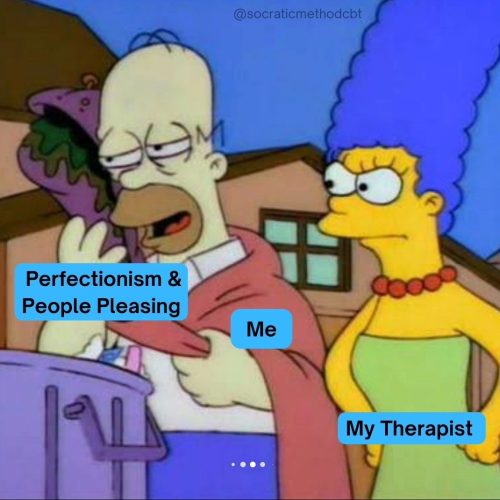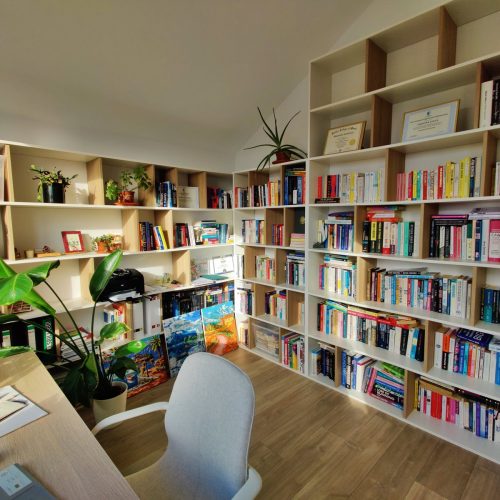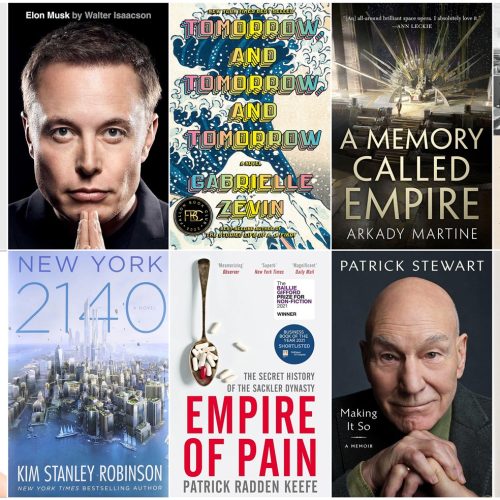Hello there, otters and baby capybaras! It’s me, Cristina, the crazy friend that sends you an email every Friday with her weird contradictory thoughts, a list of articles that will stir a debate in your mind, and incredible books she gets excited about (non-fiction, but never any bullshitty / scammy / fluffy / media hyped kind of stuff).
Missed me? Cause I sure missed you.
As you remember, the last Friday Read email I sent you was a (novel-long) plead for my switch to English. After the amazing positive messages I received from you, I now feel the need to apologize. So here it is: I’m sorry.
I’m sorry because I had such low expectations of you. I was afraid that you weren’t going to understand, that I’ll receive negative reactions, and I’ll lose all of you. Boy, was I wrong. What I received instead was a huge wave of sympathy and support. Tons of messages expressing similar thoughts and concerns. You’re awesome. Thank you.
So, now that I became aware of how alike we are, a different fear seeded in my mind. You’re a mirror of my own fears and thoughts. While glad that I’m not the only one going through this, I find troublesome the idea that we’re stuck in a bubble, with an increasing echo chamber effect.
So, how do we burst our own bubble? Cause burying our heads in the sand and deleting our Facebook accounts sure isn’t a long term universal solution.
Here are a few things that I do to override any filters:
– Whenever I read a book or article that I really-really love, I tend to get ultra hyped about it, consider it revolutionary and want to share it with everyone else I interact with, I’ll first try to actively search for articles that debunk it (subreddits work just as fine). This helps me have a clearer picture – I might not agree with all the arguments against it, but at least I’m aware of them.
– Whenever I’m about to make an important decision, I encourage my friends to pitch against it. Even when they don’t really have a strong opinion on the matter, it’s a useful exercise, as it gives me a better idea of what might go wrong. I actually try to do the same with their decisions – our trust level is high enough that we’re aware we’re not trying to bring each other down, and instead we’re doing this as a safety measure, to protect our downsides.
– Before any elections I’ll try to get out of my comfort zone and talk to those who have completely opposite views (or at least read more about their perspectives). Not to try to change their opinion and convince them to switch camps, but only to understand their reasons and thinking process. This is actually a hard exercise for me, as I tend to avoid conflicts and crawl back into my shell. I have an INTJ personality, so it’s also frustrating to be aware of how emotional others are thinking.
If you have any other tips for bubble bursting, I’d love to know them. Hit me! ![]() If this was not clear enough: this is my way of letting you know that I WANT you to contradict me – if there’s anything you don’t agree with, or you have mixed feelings about, I want to hear all your arguments. But in a nice manner, please – don’t forget I’m human and I have feelings.
If this was not clear enough: this is my way of letting you know that I WANT you to contradict me – if there’s anything you don’t agree with, or you have mixed feelings about, I want to hear all your arguments. But in a nice manner, please – don’t forget I’m human and I have feelings.
Ok, now moving on to this weekend’s recommended reading:
1. Half Life: The Decay of Knowledge and What to Do About It
A great article published last week by Shane Parrish, about the half-life of knowledge and what we can do about it.
You probably wonder what the hell does half-life mean. Well, think about all the facts that you once considered solid and were replaced by new, contradictory facts. How fat is bad for us and we should stop eating eggs and only go for low-fat food, for example – we know now how wrong we were about this one.
Knowledge decays in time. What we learn in school becomes obsolete, but we never actively try to „upgrade” that information. It’s why we should focus on learning how to learn, be open minded, not get too attached to ideas and easily adapt to new situations.
2.. Privacy and Facebook – The Nonsurprise
A few weeks ago, in one of the previous Friday Reads, I took the time to explain all the information that’s being collected about you through MailChimp, the free platform I currently use to send this newsletter. From your location, at what time you open these emails, how many times, if you don’t open them, what mail platform you use, your phone’s brand, on what links you click, and so on.
These are some pretty basic, default stuff that can be collected by any kid who’s old enough to know how to browse the internet.
Surprisingly, the only ones who were outraged by my „reveal” and chose to unsubscribe were some proclaimed marketing experts – I apologize if I sound arrogant, but if they really had any experience in marketing, they should have known about this.
It’s the same with the recent Facebook and Cambridge Analytica scandal. This is nothing new – especially for marketers. What’s new is the fact that everyone else is now starting to realize that privacy is dead and buried.
These scandals were inevitable. And although I deleted my Facebook account three months ago and consider it the best thing I could have done for my mental health, I don’t see this as a long term solution for everyone.
Read Brad Feld’s article, read the other articles he links to, and also read what Cal Newport suggests as solutions: On Social Media and Its Discontents.
3. The Western Elite from a Chinese Perspective
Insightful (and funny) thoughts on competition and how random life really is, from a Chinese atheist guy who studied in the UK and went to work in USA.
„I went to the career service office and told them that my primary goal after the MBA was to make money. I told them that $500,000 sounded like a good number. They were very confused, though, as they said their goal was to help me find my passion and my calling. I told them that my calling was to make money for my family. They were trying to be helpful, but in my case, their advice didn’t turn out to be very helpful.”
4. How to read less news but be more informed, according to a futurist
Ignore the clickbaity title and read the article, it has some useful tips on how to handle information overwhelm.
5. Praise for Japan’s earthquake preparedness measures
A small dose of shameless self promo ![]() Actually, it’s not small at all. It’s an extremely long article that I started writing on the plane back from Japan – and it was a long flight!
Actually, it’s not small at all. It’s an extremely long article that I started writing on the plane back from Japan – and it was a long flight!
It’s a praise for their earthquake preparedness measures (obviously, as the title itself says) and a list of things that we can learn & apply. It’s my biggest phobia (and obsession), so brace yourself for a really long article and lots of extra interesting resources that I link to.
I also want to ask you something. After you finish reading this article, please help me raise awareness on the matter and share it with your friends and family. And, of course, start putting those measures into practice!
6. The Most Important Gamble I’ve Made in My Career
I already told you about Ryan Holiday’s recently released book, Conspiracy. I started reading it and it’s different from anything else he ever wrote before. It’s a completely different writing style – he took it to the next level. The kind that you’ll ever love or hate (I personally fall into the former camp).
Read his story about how this book came to life and why you should give it a chance.
***
Another book I’m currently reading: Thinking in Bets: Making Smarter Decisions When You Don’t Have All the Facts, by Annie Duke
I f you want to read more on smart decision making, here’s an interesting book written by Annie Duke, a former professional poker player.
f you want to read more on smart decision making, here’s an interesting book written by Annie Duke, a former professional poker player.
At first I was wary of reading it, after Bobby brought to my attention Annie’s bad reputation in the poker world.
Nevertheless, I chose to give it a try and, so far, haven’t regretted (I’m half way into it). It’s filled with practical advice on how to make smarter decisions, compiled with sticky stories and lessons she learned from playing poker.
I grabbed this book after listening to James Altucher’s podcast episode with Annie Duke as a guest: „The Fastest Way to Become an Expert at Anything„. I advise you to do the same, their recording is a good preview of the book. Even if you don’t end up reading the book, you’ll still learn a lot.
Ok, that’s it for now. Please don’t forget about my earlier request and send over your bubble bursting tips – I’d love any thoughts.
– Cristina


